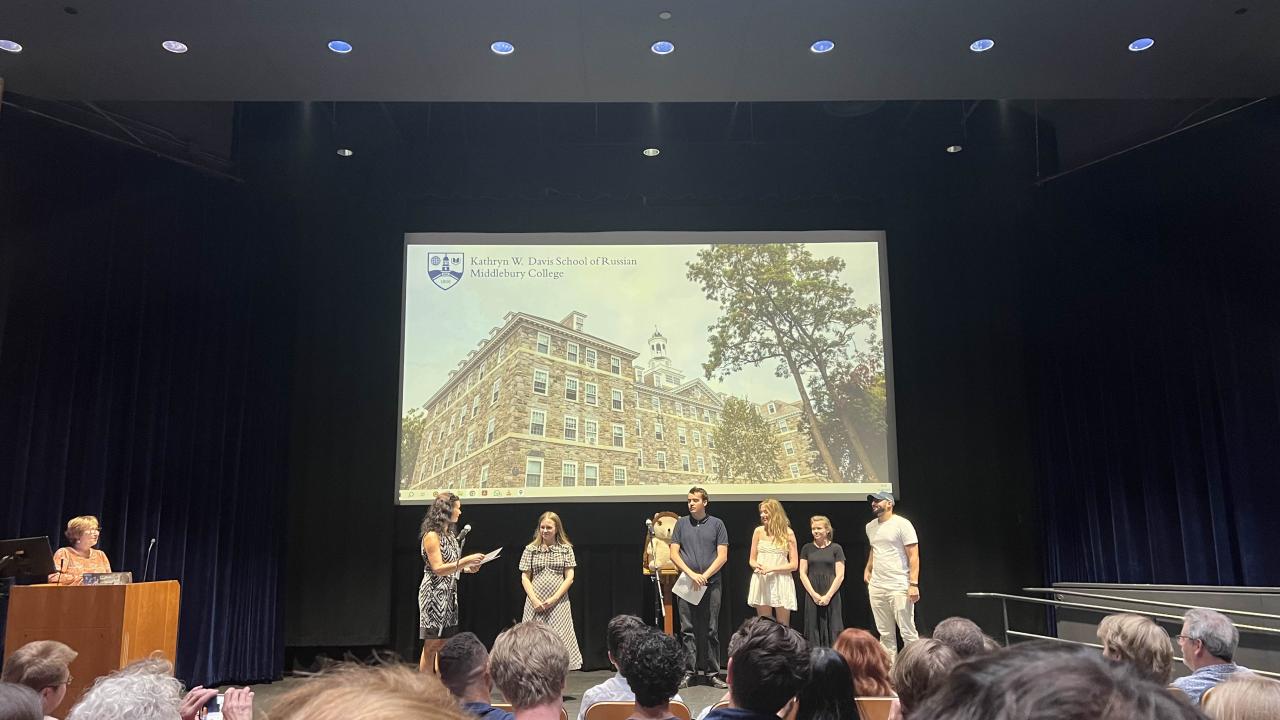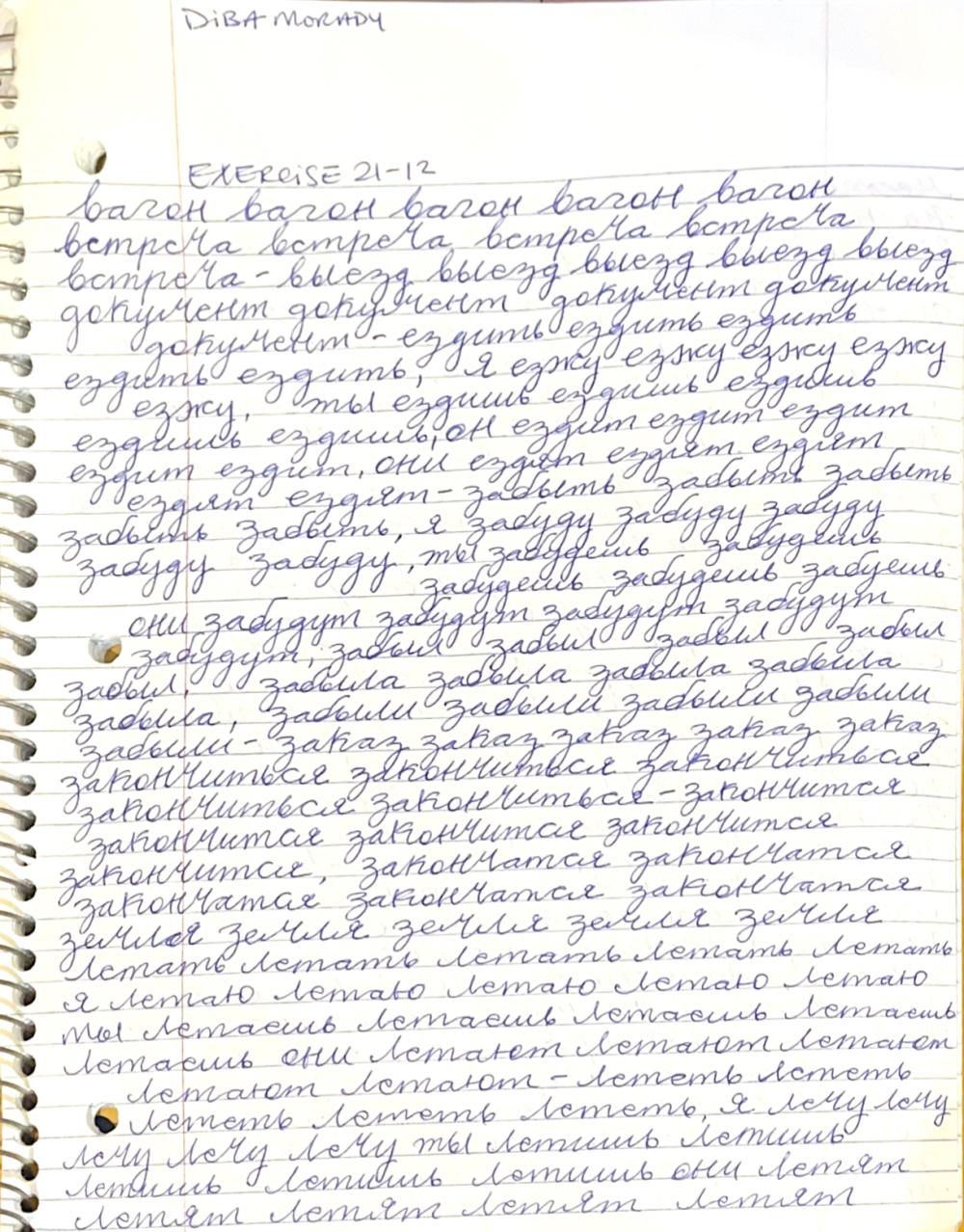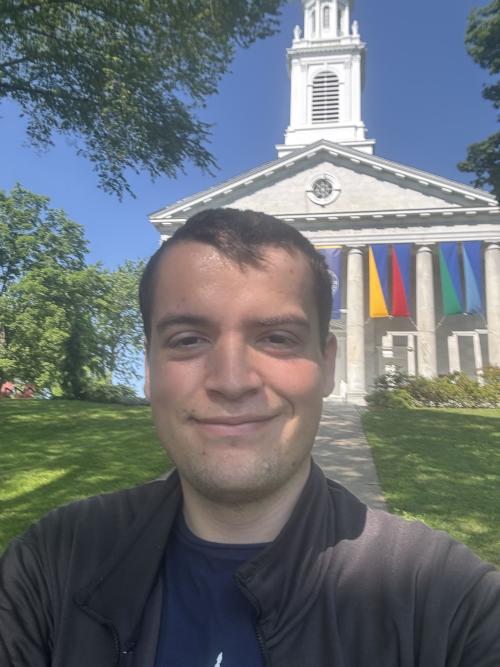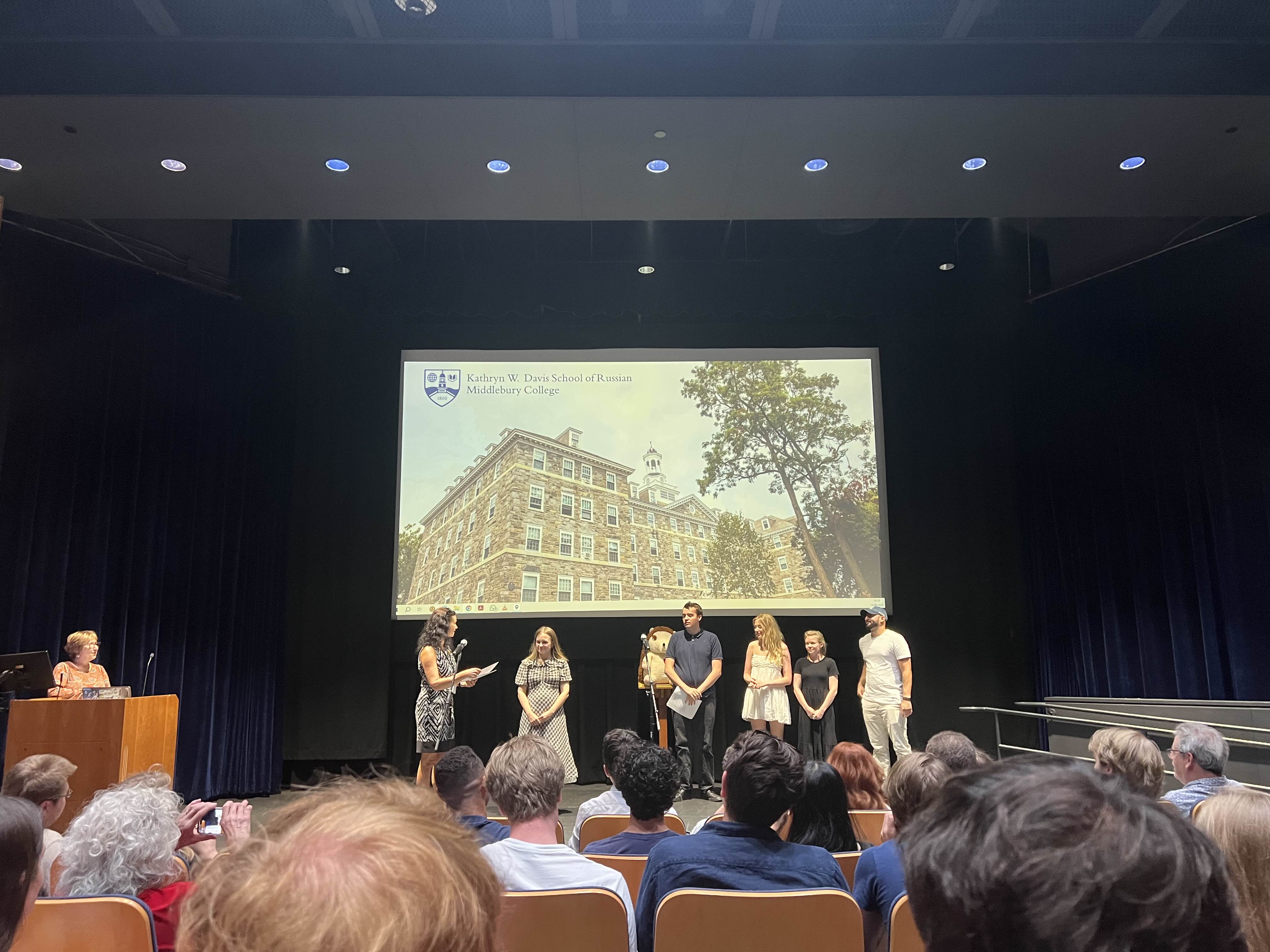
UC Davis Students Expand Russian Studies Through Summer Intensive Grant
The Summer Intensive Russian Language Grant, first offered in 2022, continues to open doors for UC Davis students pursuing advanced study of Russian language and culture. Created in response to the suspension of UCEAP programs in Russia, the grant provides financial support for declared Russian majors to participate in intensive summer language programs both in the U.S. and abroad. Grants help offset costs such as travel, housing, and course materials, making immersive study more accessible.
This past summer, two students, Diba Morady and Isaiah Heusinkveld, received support through the program and shared their experiences.
Diba Morady: Finding a New Academic Path Through Russian

I am Diba Morady, I am 21 years old, from West LA, and the child of Iranian-Jewish immigrants. This is my fourth year at UC Davis, and I am a pre-law Political Science--Public Service, and Russian double major. However, I was a pre-med Biochemistry and Molecular Biology major for the first two years of my undergraduate education. Despite having an intense love for science and medicine, I also took courses in constitutional law, international relations, and 19th-century Russian literature for personal enrichment. Soon, my passion for these topics became all-consuming and took center stage in my educational career, and I switched my major at the end of the Fall quarter of my junior year. I am interested in media (particularly film, music, literature, and art), foreign languages, travel, global politics, and science. I am studying Russian because I am fascinated by the culture and hope to spend time, both professionally and personally, living in a Russian-speaking country, working as a foreign service officer and/or attorney. Also, eventually being able to read Russian literature (specifically Dostoevsky's works) in original Russian is a serious dream of mine.
How did you hear about this grant, and why did you apply?
I heard about this grant through speaking with Professor Kaminer. In winter quarter of last year, I was in a 19th-century Russian literature course taught by Professor Mutc, and Professor Kaminer visited our class one day to talk about the Russian department. Later that week, I visited her office in Sproul Hall to inquire about possibly declaring a Russian minor, and before I knew it, I had declared a Russian double major. Because I joined the Russian department quite late in my academic career, I was behind in my language studies and credits; therefore, I chose to take an intensive elementary Russian language course at UCLA over the summer. Upon discussing my plans for the language course, Professor Kaminer informed me about the Russian Program Summer Language Grant and made the application process beyond easy.

Tell us about your experience. Where did you study under this grant?
I did not go abroad for this course; it was conducted virtually, and I attended from my home in LA. From June 23 to August 15th, Monday - Friday from 10 am to 3 pm, I studied Russian language and participated in "cultural events" and worked on homework assignments for 3-4 hours daily. The course began with learning the basics (alphabet, greetings, etc.), but by the end of the course, I was able to read, write, and form sentences in Russian with ease. I had completed a year's equivalent of university Russian language experience. The highlight of the course was being able to see how much progress I made in such a short time. Speaking Russian felt gratifying and made me proud of myself. The most challenging aspects of the course were learning cases and practicing Russian cursive. Every single day, I would have to complete an average of 6 pages of handwritten Russian cursive, which was extremely tiring but definitely rewarding.
How did this grant help you achieve your goals, and how do you think this experience will help you in the future?
Because of this grant, I now take intermediate Russian language and upper-division Russian courses at Davis, thereby closing the gaps in my language experience. I am more capable of understanding the cultural and linguistic nuances of Russian and have entered my fourth year with confidence in my learning abilities. Additionally, I am currently applying to the Fulbright US Student Program to work as an English Teaching Assistant in the country of Georgia, where I would teach English to Russian speakers in a Georgian university. This scholarship aligns seamlessly with my future professional goals of working in the international sphere and propelled my participation.
What advice would you give to students interested in studying abroad or applying for this grant?
Advice I have for students interested in applying for this grant is to be outspoken and curious. I struggle with attending office hours and asking professors questions, and really had to push myself to speak to Professor Kaminer about my academic goals in the Russian department. But once I passed that threshold of anxiety and talked about my goals and questions with Professor Kaminer, everything fell into place. I was met with open arms and genuine support. If I had stayed quiet, I probably would not have declared a double major, let alone discovered and received the grant. Another piece of advice I would impart is not to doubt yourself. I am a very self-critical person and struggle with giving myself credit for my accomplishments, which has really hindered me from reaching my maximum potential. I was so scared that I wouldn't pass my Russian language class because of my inexperience and the course's intensity, but I ended up with an A and had a great deal of fun. If I had been confident from the jump, I would have saved myself a lot of time and unnecessary stress. While I haven't studied abroad, I intend to (and I believe that everyone should). To truly comprehend a culture and speak a language fluently, one must engage with native speakers and witness the daily life of people whose identities have been shaped by such language/culture. Going abroad also expands one's ability to understand the world around them and deepens one's understanding of what life means and what it can bring (that's what I believe, at least).
Isaiah Heusinkveld: Immersed in Russian at Middlebury

I am Isaiah Heusinkveld and I am an International Relations and Russian double major. I am interested in diplomacy, geopolitics, security, and tabletop games. I chose Russian for a myriad of reasons but the chief among them is that Russian is highly applicable for diplomatic work granted that it’s one of the UN’s official languages and that it’s a critical language. The secondary benefit of learning Russian is that it’s similar to other Slavic languages and you can translate some the experience with Russian (and grammar) to other Slavic languages. After Russian I plan to learn Ukrainian and then maybe Polish so having learning experience with Russian will assist in my future endeavors to learn other Slavic languages.
How did you hear about this grant, and why did you apply?
Jenny Kaminer directly offered the grant to me because I was trying to double major at the time and was going to Middlebury. I applied to the grant because Middlebury costs as much as a quarter at Davis without financial aid. It is not cheap and the grant covered for plane tickets and supplies for my room which was very helpful.
Where did you study under this grant?
Over the summer I went to Middlebury’s Summer Immersion Program in Vermont. There were a lot of cool events at Middlebury that I attended such as Russian Choir and Russian Theater. These two things are student-run performances where people get to learn Russian through song, dance, and acting. It was cool seeing my peers tear it up on the stage like they did and was a good time. I also went to a costume party thing with the whole school, was an award recipient for my efforts in their program, and attended these fascinating lectures put on by prominent Russian journalists documenting various conflicts abroad (done entirely in Russian).
How did this grant help you achieve your goals, and how do you think this experience will help you in the future?
The grant paid for my plane ticket and necessary things such as toiletries (and a fan because you need one at Middlebury). Without it, I would have needed to also pay for the secondary costs associated with Middlebury and eat at my savings more. As such it enabled me to do Middlebury’s Summer Language Immersion program which has been immediately beneficial in many ways. The big thing is that because of the award I received and time with Middlebury I am well positioned to do the Critical Language Scholarship’s summer intensive so I can go abroad next summer.

What advice would you give to students interested in studying abroad or applying for this grant?
I highly recommend Middlebury to students who wish to study Russian. Middlebury is world renowned for a reason and other people who wish to seriously study language from all sorts of places will be there. My primary advice to you for this program is to figure out how much you will need to study to succeed. I had a very unique situation and as such I had to study Russian way more than my peers which led to me missing out on a lot of what the program had to offer. The workload for more typical students was also brutal. Plan to study three times more than usual. What’s nice about the program is that you can turn watching movies and talking with friends into studying because everything is conducted in Russian. Additionally, excessive purely academic studying (e.g. not studying enough through Middlebury’s ungodly amount of opportunities for experiential learning) can ruin the amazing networking potential that Middlebury puts on the table. World renowned places attract world renowned people after all. Будьте общительным. Дружите сo другими студентами, пожалуйста. (Translates to Be social. Make friends with other students.) The main thing that Middlebury offers is conversation completely in Russian literally every day. You will eat, sleep, and study completely in Russian 24/7 there or they may expel you. The language pledge requires you to speak Russian everyday all the time (with reasonable exceptions like being allowed to speak English with emergency services, call your family, and do interviews in English if needed). Breakfast, lunch, and dinner are all conducted in Russian. As such you should learn all words for everyday objects that you may need to ask for and basic survival phrases like “Where is the bathroom?” and as you will utilize it every day. Additionally you should learn all the words for all the grammar you currently know with Russian and as many other grammar terms as possible. It will be much easier to learn the grammar terms to prepare than to ask «Что это такое предложение?» and others when you will be constantly encountering grammar words. My last bit of advice is to buy a fan. You will thank yourself later because it gets very hot in the summer. Middlebury offers free fans if you don’t want to buy one for this reason.
About the Grant
The Summer Intensive Russian Language Grant was created in 2022 to provide Russian majors with opportunities for immersive study outside of Russia. In its first year, the program supported two students studying in the Republic of Georgia. Since then, it has helped students pursue programs both abroad and in the U.S.
With continued student interest and success stories like Morady’s and Heusinkveld’s, the grant has become an essential resource for UC Davis students dedicated to advancing their Russian language skills and preparing for careers in global fields.
